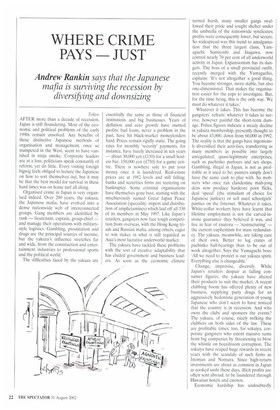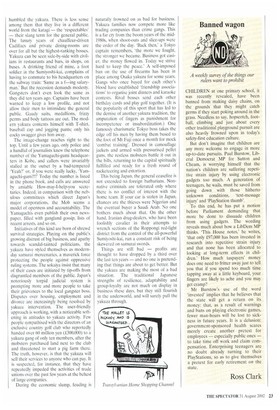WHERE CRIME PAYS JUST
Andrew Rankin says that the Japanese
mafia is surviving the recession by diversifying and downsizing
Tokyo AFTER more than a decade of recession, Japan is still floundering. Most of the economic and political problems of the early 1990s remain unsolved. Any benefits of those distinctive Japanese methods of organisation and management, once so trumpeted in the West, seem to have vanished in ninja smoke. Corporate leaders are at a loss; politicians speak constantly of reform, yet do little. Every visiting foreign bigwig feels obliged to lecture the Japanese on how to sort themselves out, but it may be that the best model for survival in these hard times was on home turf all along.
Organised crime in Japan is very organised indeed. Over 200 years, the yakuza, the Japanese mafia, have evolved into a dense nationwide web of interconnected groups. Gang members are identified by rank — lieutenant, captain, group-chief — and manage their operations with militarystyle logistics. Gambling, prostitution and drugs are the principal sources of income, but the yakuza's influence stretches far and wide, from the construction and entertainment industries to professional sports and the political world.
The difficulties faced by the yakuza are essentially the same as those of financial institutions and big businesses. Years of deflation and zero growth have stunted profits; bad loans, never a problem in the past, have hit black-market moneylenders hard. Prices remain rigidly static. The going rates for monthly 'security' payments, for instance, have barely increased in ten years — about 30.000 yen (£150) for a small hostess bar. 150,000 yen (£750) for a game centre. There is nowhere safe to put your money once it is laundered. Real-estate prices are at 1982 levels and still falling; banks and securities firms are teetering on bankruptcy. Some criminal organisations have themselves gone bust, starting with the mischievously named Great Japan Peace Association (speciality: import and distribution of amphetamines) which laid off all 330 of its members in May 1997. Like Japan's retailers, gangsters now face tough competition from overseas, with the Hong Kong triads and Russian matia, among others, eager to win stakes in what is still regarded as Asia's most lucrative underworld market.
The yakuza have tackled these problems with the sort of creative adaptability that has eluded government and business leaders. As soon as the economic climate turned harsh, many smaller gangs swallowed their pride and sought shelter under the umbrella of the nationwide syndicates; profits were consequently lower, but secure. So widespread was this trend to amalgamation that the three largest clans, Yamaguchi, Sum iyoshi and Inagawa, now control nearly 70 per cent of all underworld activity in Japan. Expansionism has its dangers. The boss of a small provincial outfit, recently merged with the Yamaguchis, explains: 'It's not altogether a good thing. You become stronger, more stable, but also one-dimensional. That makes the organisation easier for the cops to investigate. But, for the time being, this is the only way. We must do whatever it takes.'
Whatever it takes. This has become the gangsters' refrain: whatever it takes to survive, however painful the short-term damage. Police figures indicate a steady decline in yakuza membership, presently thought to be about 43,000, down from 60,000 in 1992. The reality is that the gangs have ingeniously diversified their activities, transferring as many members as possible into largely unregulated, quasi-legitimate enterprises, such as pachinko parlours and sex shops. Gambling, illegal in Japan, is not as profitable as it used to be; punters simply don't have the same cash to play with. So mobsters who once ran clandestine mah-jong dens now produce hardcore porn flicks, deal 'speed' (the stimulant of choice for Japanese junkies) or sell used schoolgirls' panties on the Internet. Whatever it takes. White-collar workers here have learnt that lifetime employment is not the carved-instone guarantee they believed it was, and live in fear of risutora — 'restructuring' — the current euphemism for mass redundancy. The yakuza, meanwhile, are taking care of their own. Better to lug crates of pachinko ball-bearings than to be out of work altogether. Says the Yamaguchi boss: 'All we need to protect is our yakuza spirit. Everything else is changeable.'
Change, improvise, diversify. While Japan's retailers despair at falling consumer figures, the yakuza have altered their products to suit the market. A recent clubbing boom has offered plenty of new business, supplying party drugs for an aggressively hedonistic generation of young Japanese who don't seem to have noticed that the country is in recession. And who owns the clubs and sponsors the events? The yakuza, of course, nicely milking the clubbers on both sides of the law. These are profitable times, too, for sokaiya, corporate gangsters who extort massive sums from big companies by threatening to blow the whistle on boardroom corruption. The sokaiya have reaped huge rewards in recent years with the scandals of such firms as Ittoman and Nomura. Since high-return investments are about as common in Japan as cooked sushi these days, illicit profits are often sent abroad, to be laundered through Hawaiian hotels and casinos.
Economic hardship has undoubtedly humbled the yakuza. There is less sense among them that they live in a different world from the katagi — the srespectables' — their slang term for the general public. The luxury years of chauffeur-driven Cadillacs and private dining-rooms are over for all but the highest-ranking bosses. Yakuza can be seen side-by-side with civilians in restaurants and bars, in shops, on buses. A drinking friend of mine, a foot soldier in the Sumiyoshi-kai, complains of having to commute to his headquarters on the subway train: 'Same as a f—ing salaryman.' But the recession demands modesty. Gangsters don't even look the same as they did ten years ago. Captains have been warned to keep a low profile, and not allow their men to intimidate the general public. Gaudy suits, medallions, frizzy perms and body tattoos are out. The modern yakuza contents himself with T-shirt, baseball cap and jogging pants; only his cocky swagger gives him away.
The image-change reaches right to the top. Until a few years ago, only police and a handful of journalists knew the telephone number of the Yamaguchi-gumi headquarters in Kobe, and callers were invariably stalled at the outset by a bad-tempered 'Yeah?' or. if you were really lucky, 'Yamaguchi-gumi!!!' Today the number is listed in the phone book, and calls are answered by amiable How-may-I-help-you secretaries. Indeed, in comparison with the nebulous committees which direct Japan's major corporations, the Mob seems a model of openness and accountability. The Yamaguchis even publish their own newspaper, filled with gangland gossip, lists of recent arrests, and so on.
Initiatives of this kind are born of shrewd survival strategies. Playing on the public's growing distrust of big business, and apathy towards scandal-tainted politicians, the yakuza have styled themselves as modernday samurai mercenaries, a maverick force protecting the people against oppressive ruling systems. The sokaiya insist that many of their cases are initiated by tip-offs from disgruntled members of the public. Japan's notoriously torpid judicial system is prompting more and more people to take their grievances to the local gangster boss. Disputes over housing, employment and divorce are increasingly being resolved by yakuza intervention. The user-friendly approach is working, with a noticeable softening in attitudes to yakuza activity. Few people sympathised with the directors of an exclusive country golf club who reportedly handed over 60 million yen (£300,000) to a yakuza gang of only ten members, after the mobsters purchased land next to the club and threatened to start a pig farm there. The truth, however, is that the yakuza will sell their services to anyone who can pay. It is suspected, for instance, that they have repeatedly impeded the activities of trade unions over the past few years at the behest of large companies.
During the economic slump, feuding is naturally frowned on as bad for business. Yakuza families now compete more like trading companies than crime gangs. This is a far cry from the boom years of the mid1980s, when shoot-outs and slice-ups were the order of the day. 'Back then,' a Tokyo captain remembers, 'the more we fought. the stronger we became. Business got easier, the money flowed in. Today we strive hard to keep the peace.' A self-imposed ban on the use of firearms has been in place among Osaka yakuza for some years. Gangs who once bayed for each other's blood have established 'friendship associations' to organise joint dinners and karaoke contests. Rival bosses send each other birthday cards and play golf together. (It is the popularity of this sport that has led to the demise of another yakuza tradition, the amputation of fingers as punishment for incompetence or insubordination.) One famously charismatic Tokyo boss takes the edge off his men by having them bused to the foot of Mt Fuji once a month for mock 'combat training'. Dressed in camouflage jackets and armed with pressurised pellet guns, the restless mobsters battle it out in the hills, returning to the capital spiritually fulfilled and ready for a fresh round of racketeering and extortion.
This being Japan, the general ceasefire is not extended to foreign barbarians. Nonnative criminals are tolerated only where there is no conflict of interest with the home team. If your car is stolen in Japan, chances are the thieves were Nigerian and the eventual buyer a Saudi Arab. No one bothers much about that. On the other hand, Iranian drug-dealers, who have been foolishly cavalier in their attempts to wrench sections of the Roppongi red-light district from the control of the all-powerful Sumiyoshi-kai, run a constant risk of being skewered on samurai swords.
Things are still bad — profits are thought to have dropped by a third over the last ten years — and no one is pretending that things are about to get better. But the yakuza are making the most of a bad situation. The traditional Japanese strengths of resilience, adaptability and group-loyalty arc not much on display in business these days, but they still flourish in the underworld, and will surely pull the yakuza through.



























































 Previous page
Previous page